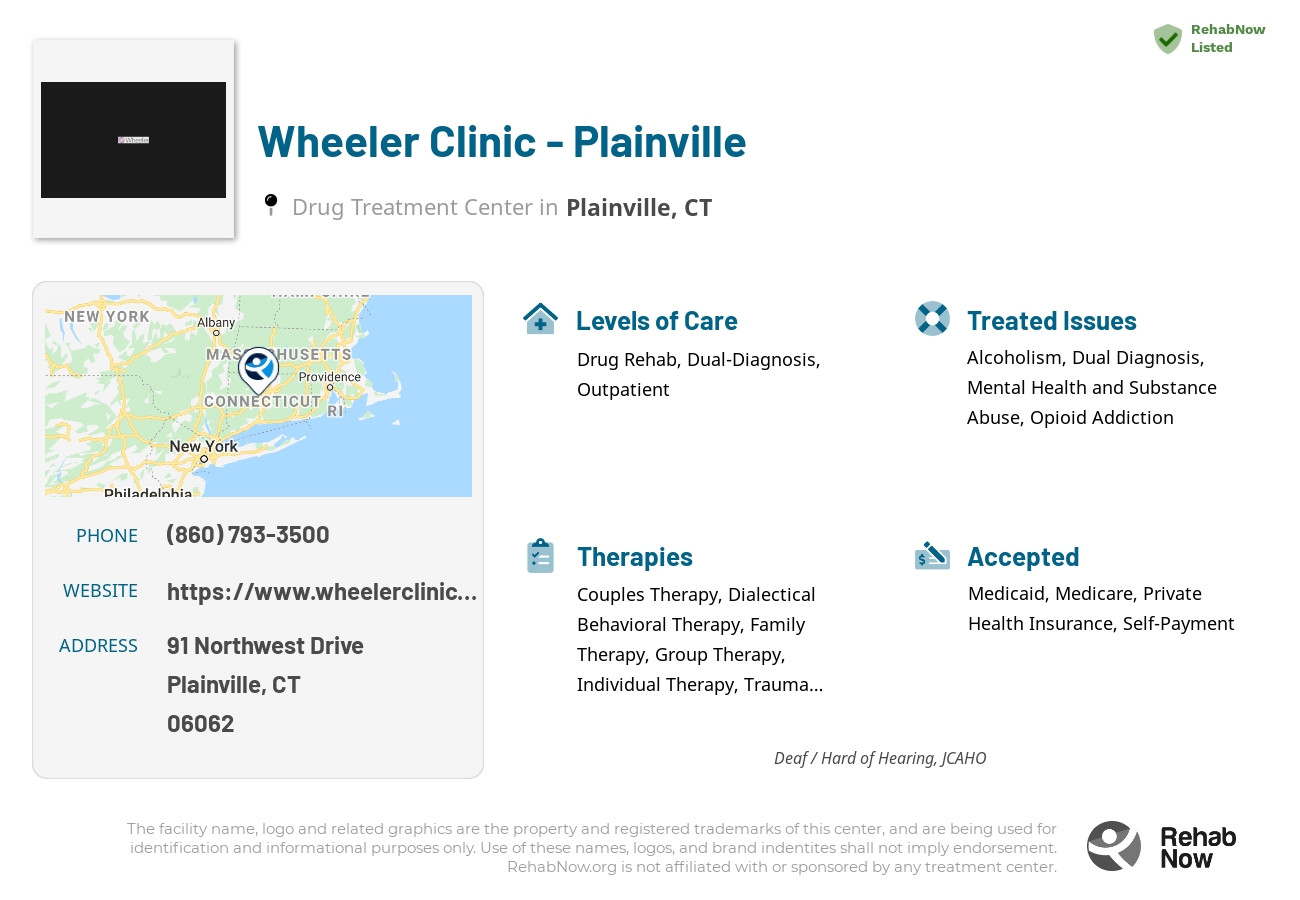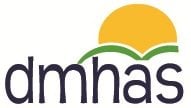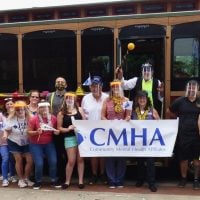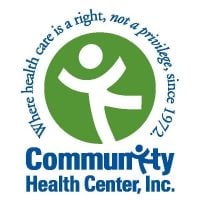Wheeler Clinic - Plainville
Drug Rehab Center in Plainville, Connecticut
Wheeler Clinic - Plainville is a behavioral health facility in Plainville, CT, with a multidisciplinary team providing evidence-based treatment modalities for addiction and behavioral health services, including individual and family therapy, medication management, and support groups.
About This Connecticut Facility
Wheeler Clinic in Plainville, Connecticut, stands out as a beacon of hope for men and women striving for recovery from drug and alcohol addiction. This facility not only focuses on addiction recovery but also integrates mental health treatment, showcasing a unique commitment to treating the whole person. With an inclusive approach, offering LGBTQIA-friendly services and specialized tracks for the elderly, Wheeler Clinic goes above and beyond to cater to diverse needs.
- Person-Centered Care: Wheeler Clinic prioritizes dignity and respect, tailoring treatment to each individual’s needs.
- Comprehensive Services: From psychiatric evaluations to crisis services, the clinic offers a wide array of outpatient programs.
- Innovative Treatment Methods: Utilizing methods like transcranial magnetic stimulation alongside traditional therapy, Wheeler Clinic adopts an innovative approach to recovery.
Accredited by the Joint Commission on Accreditation of Healthcare Organizations (JCAHO), Wheeler Clinic adheres to high standards of quality and safety in healthcare. This recognition underscores their commitment to providing exceptional care, with a focus on accessible, innovative solutions that encourage health and recovery.
Wheeler Clinic addresses a range of addictions and issues, including substance abuse, mental health disorders, and gambling addiction. Treatment methods are comprehensive, incorporating individual counseling, case management, and care management services to support clients through their recovery journey.
Genders
Ages
Modality
Additional
Accreditations

JCAHO
Conditions and Issues Treated
Opioid addiction treatment should be done in a medically supervised drug rehab. Opioid addiction treatment will include detoxification and drug rehab counseling to help both the user and their loved ones learn how to live a successful sober lifestyle. Methadone, buprenorphine, and naltrexone are three medications that can help treat opioid addiction. Individual drug rehab counseling sessions can be helpful to discuss any questions or concerns with the drug treatment program.
When addiction and psychiatric issues co-occur, the addict’s recovery is more successful when both conditions are treated. A dual diagnosis refers to a condition in which the patient is diagnosed with two health issues: addiction and bipolar disorder.
Usually, dual diagnosis sufferers are prescribed a combination of treatments for each condition. The most common therapies are psychotherapy, behavioral therapy, spiritual counseling, 12-step programs, and medication management.
Psychiatric conditions are an obstacle to recovery because they can create roadblocks to a healthy lifestyle. Drugs and alcohol may be used as a means of self-medication, which can have dangerous consequences. Over time, addicts build up a tolerance and suffer withdrawal symptoms when drug use is stopped.
With the proper treatment, dual diagnosis sufferers can overcome their conditions and achieve lasting sobriety.
Levels of Care Offered at Wheeler Clinic - Plainville
This center offers a variety of custom treatment tailored to individual recovery. Currently available are Drug Rehab, Dual-Diagnosis, Outpatient, with additional therapies available as listed below.
Individuals struggling with drug addictions can get help from several treatment options, including inpatient and outpatient programs. Outpatient drug treatment programs can also provide patients with different levels of care, usually depending on the patient’s degree of addiction.
At an outpatient program in Plainville, a patient will attend a recovery program during the day and return home in the evening. Suppose a patient is struggling with drug addiction. In that case, an outpatient program can serve as an effective transition point during the recovery process.
Therapies & Programs
Individual therapy is a critical component of addiction recovery. It allows the patients to go deep into their core issues and discover how to handle those problems better. Therapy can be conducted in individual sessions as well as group settings. In individual therapy for addiction, the patient meets with their therapist one-on-one to focus on the underlying issues. This allows patients to open up and discuss personal topics they may not feel comfortable discussing in a group setting. This type of therapy can help develop solutions specific to each patient, which helps speed up the recovery process.
Couples therapy is beneficial for couples in which at least one partner has a substance use disorder. This type of therapy can help partners improve communication skills, which is an important factor in a healthy relationship. It can also help partners better understand one another so they have a greater understanding of how the other partner may be feeling.
Benefits of couples therapy include:
- Improvement in communication skills
- Increased understanding of the dynamics within a relationship
- Increased sense of support and trust in the relationship
- Better teamwork between partners/increased willingness to listen and work together
- Enhanced tolerance of each other’s shortcomings
- Improved ability to have open, honest communication with each other
Family therapy is a crucial part of drug treatment and getting sober. It is one of the most effective ways to help addicts stay on the path to long-term sobriety. When a drug addict decides that they want to try and get sober, it takes the support of every person they love to succeed. It can be incredibly difficult for loved ones to watch an addict go through the pain and suffering of withdrawal, but by being there with them and supporting them, they can help to make sure that the addiction never returns.
One of the most important parts of family therapy is the relapse prevention plan. During treatment, therapists and doctors will often sit down with the addict and their family to develop a plan in case the addict ever feels like they want to use again. This plan should involve steps the addict and family can take together to prevent them from relapsing in the future. An addict’s family can play a vital part in helping them to avoid relapse because they can spot the warning signs and help them get back on track before it becomes too much of a problem.
Group therapy helps prevent addicts from feeling isolated or unique in their situation by offering a sense of comfort and fellowship. It also creates a forum for addicts to build their support systems and learn from each other. The group therapy sessions at Wheeler Clinic - Plainville occur in a group setting rather than one-on-one to create a safer, controlled environment where addicts feel comfortable.
Trauma therapy helps people dealing with addiction by allowing them to confront the traumas of their past and move past them. It is important to note that trauma therapy should not be confused with PTSD (post-traumatic stress disorder) Rather, it is used to treat the effects of trauma, which are often at the root of addiction.
Dialectical Behavior Therapy was developed in the 1980s to treat chronically suicidal individuals. It is a cognitive-behavioral therapy that combines strategies derived from Zen Buddhism, such as mindfulness training. DBT has been adapted for use with other types of psychiatric problems, including substance abuse and personality disorders. DBT aims to help patients change their thinking and behavior, instead of relying on medication.
Cognitive Behavioral Therapy (CBT) is a common therapeutic approach to help drug addicts. It teaches addicts new ways of thinking and behaving so that they can avoid relapse. There are several forms of CBT used in drug rehabilitation centers.
Cognitive Restructuring helps addicts identify faulty, negative thinking so that they can work together with the therapist to find healthier ways of thinking, resulting in better decision-making.
Cognitive Behavioral Therapy for Addiction uses the principles of CBT to help treat addiction. It focuses on specific aspects of each person’s thinking, feeling, physiology, and behavior. It aims to identify specific problems in these areas and create a personalized treatment strategy.
Payment Options Accepted
For specific insurance or payment methods please contact us.
Is your insurance accepted?
Ask an expert, call (888) 674-0062
Wheeler Clinic Associated Centers
Discover treatment facilities under the same provider.
- Wheeler Clinic - Adult Outpatient Services in New Britain, CT
- Wheeler - Bristol Family Health & Wellness Center in Bristol, CT
- Wheeler Clinic - Main Campus in Plainville, CT
- Wheeler Clinic - Administrative Offices Only - Hartford in Hartford, CT
- Wheeler Clinic - Main Campus - Plainville in Plainville, CT
Learn More About Wheeler Clinic Centers
Additional Details
Specifics, location, and helpful extra information.
Plainville, Connecticut 6062 Phone Number(860) 793-3500 Meta DetailsUpdated April 15, 2024
Staff Verified
Patient Reviews
There are no reviews yet. Be the first one to write one.
Plainville, Connecticut Addiction Information
Connecticut has a higher rate of substance abuse and addiction than the national average. The state ranks in the top 10 in the country for illicit drug dependence among those ages 18 to 25. In 2010, there were 9,211 people admitted to an alcohol treatment facility for alcohol abuse combined with a secondary drug. Connecticut ranked fifth in the United States of America for the number of fatalities involving drunk driving in 2014.
One of the most severe problems Plainville faces is drug and alcohol addiction. The community has seen an increase in drug-related crimes in recent years. Plainville's most commonly abused drugs are opioids, cocaine, and alcohol. Between 2002 and 2016, the rate of drug-related deaths more than tripled in Plainville. Inpatient and outpatient treatment are the most traditional forms of drug treatment, and they provide the patient with around-the-clock care and support.
Treatment in Nearby Cities
- Winsted, CT (18.4 mi.)
- East Canaan, CT (30.4 mi.)
- Brookfield, CT (31.0 mi.)
- Shelton, CT (28.2 mi.)
- New Britain, CT (5.6 mi.)
Centers near Wheeler Clinic - Plainville
The facility name, logo and brand are the property and registered trademarks of Wheeler Clinic - Plainville, and are being used for identification and informational purposes only. Use of these names, logos and brands shall not imply endorsement. RehabNow.org is not affiliated with or sponsored by Wheeler Clinic - Plainville.









